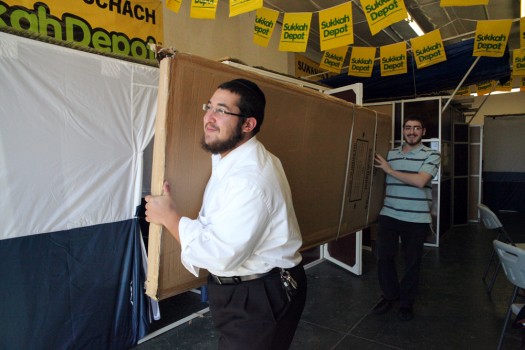
Inside Brooklyn’s Lucrative Pre-Fab Sukkah Headquarters
A dozen or so Israelis, most of them in their early twenties and right out of the military, arrived for work last month in a dingy red brick warehouse in Brooklyn’s East Williamsburg neighborhood. The warehouse—with a sign that still reads “Q-Mart: Import, Export, Wholesale”—serves as the seasonal home of Sukkah Depot, a company that sets up shop each year to sell only one product: pre-fab sukkos.
The temporary huts are key to observance of the Jewish harvest-themed holiday of the same name, and selling the structures is a lucrative niche market. In the weeks leading up to the holiday, the company ships thousands of sukkos all over world, earning about $25,000 a day in revenue.
Sukkos isn’t as popular or widely observed among more secular Jews as the high holidays of Rosh Hashanah and Yom Kippur that precede it, but the week-long harvest-time celebration is much more fun. The holiday, which begins on Sept. 18 this year, requires the construction of a three-sided booth-like structure in honor of the dwellings used in the biblical period of wandering through the desert with Moses. A sukkah follows strict guidelines set out in the Torah. The structure must be at least seven-by-seven “handbreaths,” or a little over four square feet, with no limit as to how big it can be. It has to be built outside, then given a thatched roof made of “natural” products such as bamboo or branches. Families often decorate the huts with seasonal vegetables and crafts made by children, and it’s customary to eat meals during the week inside the sukkah.
Many people build their own sukkos, but there’s no rule against buying one already constructed from what is essentially a Jewish Ikea. In the more than three decades Sukkah Depot has been operating, it has sold more than half a million pre-made huts. “There has never been a better way to set up your sukkah without breaking a sweat!” Sukkah Depot advertises on its website.
“We have ones with wooden panels, nylon, and canvas—although this year we stopped using real canvas and now make them out of this polyester parachute material because it’s more weather resistant,” says Avi, the company’s 29-year-old manager, who identified himself as the only American in the warehouse. He is also the only Sukkah Depot employee who will talk to me, and even he declined to give his last name or disclose any information about Sukkah Depot’s owners and what they do for the rest of the year. The people who own Sukkah Depot, he assures me, are very private.
Avi oversees the warehouse, which is Sukkah Depot’s main call center and central shipping location. Customers don’t shop there. In New York, they can visit one of 19 pop-up stores peppered throughout the city, mostly in Jewish neighborhoods, while customers from elsewhere can place orders online or by phone.
It’s a good thing no one visits the warehouse because it’s a dump. Wires hang from between broken ceiling tiles, and the walls are badly scuffed. An unidentifiable sticky substance covers part of the linoleum floor. Employees answer phones and take orders in a glass-walled room, next to which two display sukkahs have been half-heartedly constructed.
The light blue nylon Classic Sukkah (price tag: $410) is about the size of an office cubicle. The green Royal Sukkah with bamboo covering (price tag: $1,155) looks like it could double as a carport. The fanciest model sold by Sukkah Depot is a 240-square-foot faux-wooden-paneled structure that can be assembled without tools like a giant Lego Set and runs close to $3,000.
For its two-month annual stretch, the company’s Brooklyn headquarters is an around-the-clock operation with employees logging 12-hour shifts. When I meet Avi two weeks before the holiday, he looks like he hasn’t slept in days. His eyes are bloodshot and a baggy t-shirt shirt hangs off him like an afterthought. He’s had to put his other job, providing medical services to concerts and festivals, on hold while he works at Sukkah Depot. The business will stay open throughout the holiday to deal with last-minute customer requests before shutting down within a week or two.
And then? “They sell this place and everyone goes back to Israel,” Avi says. “Except for me. I live in Queens.”
















i spy
nar rator
CGI
His familia actaully calls him “the Nar Rator” but u can call him Nar Rator for short.
mendy
Yitzy!!!
1st of many in BusinessWeek
Next time you will be the big successful boss!!